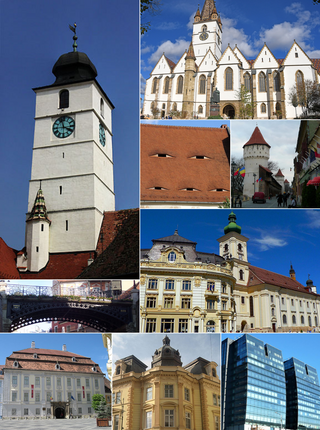Thalia Hall may refer to:
Latina or Latinas most often refers to:
Hyde Park may refer to:
Olympia may refer to:
Forum or The Forum may refer to:
Roosevelt most often refers to two American presidents, Theodore Roosevelt, 26th president, and Franklin D. Roosevelt, 32nd president.
State most commonly refers to:

Sibiu is a city in central Romania, situated in the historical region of Transylvania. Located some 275 km (171 mi) north-west of Bucharest, the city straddles the Cibin River, a tributary of the Olt River. Now the seat of Sibiu County, between 1692 and 1791 and 1849–65 Sibiu was the capital of the Principality of Transylvania. Until 1876, the Hecht hause in Sibiu served as the seat of the Transylvanian Saxon University.
The United States of America is the home of the hip hop dance, swing, tap dance and its derivative Rock and Roll, and modern square dance and one of the major centers for modern dance. There is a variety of social dance and performance or concert dance forms with also a range of traditions of Native American dances.
Thalia, Thalía, Thaleia or Thalian may refer to:
Sheldon may refer to:
Mann may refer to:
Haymarket may refer to:
Thalia Theatre and Thalia Theater may refer to:
Read or READ may refer to:
Circle Theatre or Circle Theater may refer to:

Thalia Mara Mahoney was an American ballet dancer and educator who authored 11 books on the subject.

The Thalia Hall is a theatre and concert hall situated in Sibiu, Romania. As of October 7, 2004, the hall serves as the new location of the State Philharmonic of Sibiu.

The Viva! Tour was the fifth concert tour by Mexican recording artist Thalía in support of her first live album Primera fila and her eleventh studio album Habítame Siempre, both of which have had a huge commercial impact in all over Latin America and the United States. It was also Thalía's first tour in nine years, following the 2004 High Voltage Tour, and it was considered one of the most anticipated Latin tours in 2013. The tour started in Chicago on March 24, 2013 and was planned to include concerts in all over Latin America and potentially Europe, but this was later scrapped. The tour consisted of intimate concerts in musical venues and concert halls with limited capacity, as this is the artistic concept of Thalía's most recent album releases.

The Latina Love Tour was the sixth concert tour by Mexican recording artist Thalía in support of her 2016 album Latina. This album had a huge commercial impact in all over Latin America and the United States. It was also Thalía's first tour in three years, following the 2013 The VIVA! Tour. The tour started in New Jersey on September 23, 2016 and concluded on October 18 at the National Auditorium in Mexico City.

Thalia Hall is a historic building in Pilsen, Chicago, Illinois, US, which is currently a mixed-use music, retail, and bar/restaurant space. It was designated as a Chicago Landmark on October 25, 1989.